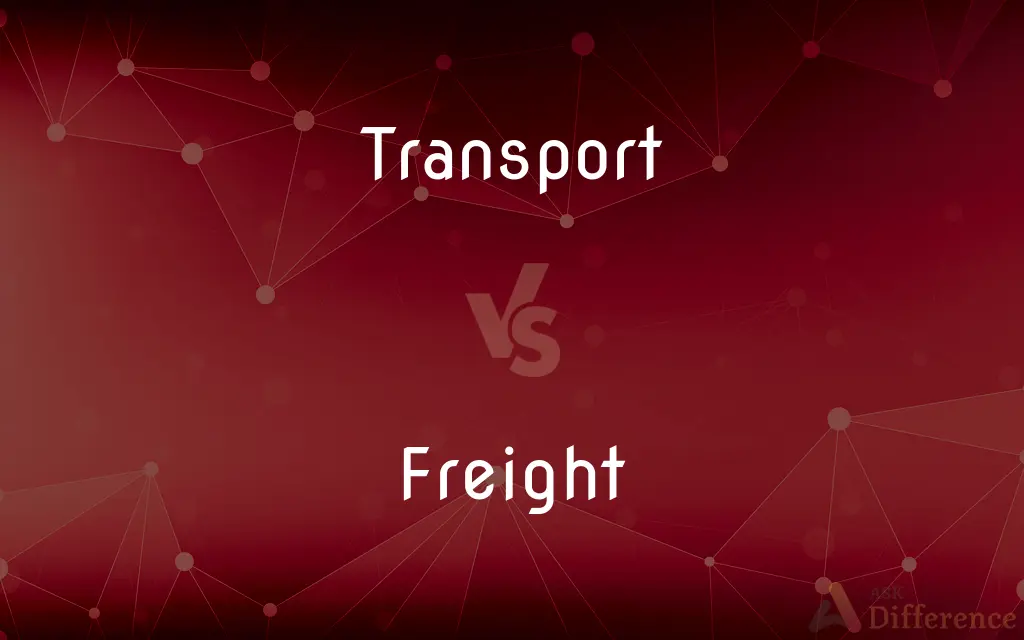Transport vs. Freight — What's the Difference?
By Tayyaba Rehman & Maham Liaqat — Updated on April 21, 2024
Transport refers to the movement of goods or people from one place to another, while freight specifically denotes goods transported in bulk.

Difference Between Transport and Freight
Table of Contents
ADVERTISEMENT
Key Differences
Transport encompasses the general concept of moving objects, people, or animals from one location to another using various modes like road, rail, air, or sea. On the other hand, freight specifically refers to the shipment of goods, often in large quantities, and is usually commercial in nature.
In transport, the focus can be on passenger services, logistics, and mobility solutions tailored to individual or public needs. Whereas, freight deals exclusively with cargo and emphasizes efficiency, volume, and the logistics of goods distribution.
Transport systems are designed to accommodate both speed and accessibility, optimizing for passenger convenience and safety. Conversely, freight systems prioritize capacity, durability, and cost-effectiveness, often using specialized vehicles and equipment.
The regulatory requirements for transport can vary widely, covering safety protocols for passengers and environmental considerations. In contrast, freight regulations focus more on cargo safety, customs, and industry-specific standards.
Transport infrastructure, such as roads, airports, and transit hubs, serves the dual purpose of supporting both passenger and freight activities. Freight infrastructure, such as cargo terminals and dedicated freight corridors, is tailored specifically to handle large volumes of goods.
ADVERTISEMENT
Economic impacts of transport are broad, influencing urban development and individual mobility. Freight, however, directly affects commerce and trade, often being a critical component in supply chain management.
Comparison Chart
Definition
Movement of people or goods
Shipment of goods in bulk
Primary Focus
Passenger convenience and safety
Cargo volume and logistics
Modes
Road, rail, air, sea
Often limited to cargo-specific modes
Regulatory Concerns
Safety protocols, environmental impact
Cargo safety, customs, industry standards
Economic Impact
Urban development, mobility
Commerce, supply chain management
Compare with Definitions
Transport
Organized arrangements for moving large numbers of people.
The government organized transport for evacuees from the disaster zone.
Freight
The system by which goods are transported.
The national freight network is undergoing significant upgrades.
Transport
The act of moving something from one location to another.
Transport of hazardous materials is strictly regulated.
Freight
Goods transported in bulk by truck, train, ship, or aircraft.
The freight shipment includes several containers of electronics.
Transport
Movement of people or goods from one place to another via various modes.
The city’s public transport system is highly efficient.
Freight
Loaded cargo vehicles.
A freight train carrying coal derailed yesterday.
Transport
The system or means of conveying people or goods.
We chose rail transport for our cross-country trip.
Freight
A charge paid for transport of goods.
The freight costs have increased due to higher fuel prices.
Transport
A vehicle designed for moving goods or people.
The new transport bus can seat up to sixty passengers.
Freight
Transporting of goods in bulk.
The company specializes in freight transport between Europe and Asia.
Transport
Transport (BE) or transportation (AE) is the movement of humans, animals, and goods from one location to another. In other words, the action of transport is defined as a particular movement of an organism or thing from a point A (a place in space) to a point B. Modes of transport include air, land (rail and road), water, cable, pipeline, and space.
Freight
Goods transported in bulk by truck, train, ship, or aircraft
A decline in the amount of freight carried by rail
Transport
Take or carry (people or goods) from one place to another by means of a vehicle, aircraft, or ship
The bulk of freight traffic was transported by lorry
Freight
A freight train
I can hear the regular wail of the twelve o'clock freight from my house
Transport
Overwhelm (someone) with a strong emotion, especially joy
She was transported with pleasure
Freight
A load or burden
These warm winds deposit their freight of moisture in showers of rain
Transport
A system or means of conveying people or goods from place to place
Air transport
Many possess their own forms of transport
Freight
Transport (goods) in bulk by truck, train, ship, or aircraft
The metals had been freighted from the city
Transport
An overwhelmingly strong emotion
Art can send people into transports of delight
Freight
Be laden or burdened with
Each word was freighted with anger
Transport
To move or carry (goods, for example) from one place to another; convey.
Freight
Goods carried by a vessel or vehicle, especially by a commercial carrier; cargo.
Transport
To cause to feel strong emotion, especially joy; carry away; enrapture.
Freight
A burden; a load.
Transport
To send abroad to a penal colony; deport.
Freight
Commercial transportation of goods.
Transport
The act of transporting; conveyance.
Freight
The charge for transporting goods. Also called freightage.
Transport
The condition of being transported by emotion; joy or rapture.
Freight
A railway train carrying goods only.
Transport
A ship or aircraft used to transport troops or military equipment.
Freight
To convey commercially as cargo.
Transport
A vehicle, such as an aircraft, used to transport passengers, mail, or freight.
Freight
To load with goods to be transported.
Transport
The system of transporting passengers or goods in a particular country or area.
Freight
To imbue with a specified element or elements
Freighted her words with innuendo.
Transport
The vehicles, such as buses and trains, used in such a system.
Freight
(uncountable) The transportation of goods (originally by water; now also by land); also, the hiring of a vehicle or vessel for such transportation.
Transport
A deported convict.
Freight
(uncountable) Goods or items in transport; cargo, luggage.
The freight shifted and the trailer turned over on the highway.
Transport
To carry or bear from one place to another; to remove; to convey.
To transport goods; to transport troops
Freight
(countable) Payment for transportation.
The freight was more expensive for cars than for coal.
Transport
(historical) To deport to a penal colony.
Freight
(figuratively)
Transport
(figuratively) To move (someone) to strong emotion; to carry away.
Music transports the soul.
Freight
(countable) A burden, a load.
Transport
An act of transporting; conveyance.
Freight
Cultural or emotional associations.
Transport
The state of being transported by emotion; rapture.
Freight
(transitive)
Transport
A vehicle used to transport (passengers, mail, freight, troops etc.)
Freight
To load (a vehicle or vessel) with freight (cargo); also, to hire or rent out (a vehicle or vessel) to carry cargo or passengers.
Transport
(Canada) A tractor-trailer.
Freight
To transport (goods).
Transport
The system of transporting passengers, etc. in a particular region; the vehicles used in such a system.
Freight
(by extension) To load or store (goods, etc.).
Transport
A device that moves recording tape across the read/write heads of a tape recorder or video recorder etc.
Freight
(figuratively) To carry (something) as if it is a burden or load.
Transport
(historical) A deported convict.
Freight
Chiefly followed by up: to carry as part of a cargo.
Transport
To carry or bear from one place to another; to remove; to convey; as, to transport goods; to transport troops.
Freight
(obsolete) Freighted; laden.
Transport
To carry, or cause to be carried, into banishment, as a criminal; to banish.
Freight
That with which anything is fraught or laden for transportation; lading; cargo, especially of a ship, or a car on a railroad, etc.; as, a freight of cotton; a full freight.
Transport
To carry away with vehement emotion, as joy, sorrow, complacency, anger, etc.; to ravish with pleasure or ecstasy; as, music transports the soul.
[They] laugh as if transported with some fitOf passion.
We shall then be transported with a nobler . . . wonder.
Freight
The sum paid by a party hiring a ship or part of a ship for the use of what is thus hired.
Transport
Transportation; carriage; conveyance.
The Romans . . . stipulated with the Carthaginians to furnish them with ships for transport and war.
Freight
Freight transportation, or freight line.
Transport
A vessel employed for transporting, especially for carrying soldiers, warlike stores, or provisions, from one place to another, or to convey convicts to their destination; - called also transport ship, transport vessel.
Freight
Employed in the transportation of freight; having to do with freight; as, a freight car.
Transport
Vehement emotion; passion; ecstasy; rapture.
With transport views the airy rule his own,And swells on an imaginary throne.
Say not, in transports of despair,That all your hopes are fled.
Freight
To load with goods, as a ship, or vehicle of any kind, for transporting them from one place to another; to furnish with freight; as, to freight a ship; to freight a car.
Transport
A convict transported, or sentenced to exile.
Freight
Goods carried by a large vehicle
Transport
Something that serves as a means of transportation
Freight
Transporting goods commercially at rates cheaper than express rates
Transport
An exchange of molecules (and their kinetic energy and momentum) across the boundary between adjacent layers of a fluid or across cell membranes
Freight
The charge for transporting something by common carrier;
We pay the freight
The freight rate is usually cheaper
Transport
The commercial enterprise of transporting goods and materials
Freight
Transport commercially as cargo
Transport
A state of being carried away by overwhelming emotion;
Listening to sweet music in a perfect rapture
Freight
Load with goods for transportation
Transport
A mechanism that transport magnetic tape across the read/write heads of a tape playback/recorder
Transport
Move something or somebody around; usually over long distances
Transport
Move while supporting, either in a vehicle or in one's hands or on one's body;
You must carry your camping gear
Carry the suitcases to the car
This train is carrying nuclear waste
These pipes carry waste water into the river
Transport
Hold spellbound
Transport
Transport commercially
Transport
Send from one person or place to another;
Transmit a message
Common Curiosities
How do safety regulations differ between transport and freight?
Transport regulations cover passenger safety and environmental impacts, while freight regulations focus on cargo safety and handling.
Are the logistics of managing transport different from managing freight?
Yes, the logistics of managing transport involves scheduling, routing, and maintaining vehicles for passenger comfort and timeliness. Managing freight logistics, however, focuses more on supply chain efficiency, inventory management, and optimizing the cost and speed of cargo delivery.
What are common modes of freight transport?
Common modes include trucks, trains, ships, and aircraft.
Can the term transport include freight?
Yes, transport includes both the movement of goods (freight) and people.
What is the economic impact of freight?
Freight has a direct impact on commerce and trade, crucial for supply chain management.
Can both transport and freight services be provided by the same company?
Yes, some companies provide both transport and freight services, especially in cases where logistics companies expand their services to include passenger transport, or public transport providers offer cargo options, such as railways and airlines.
What is the main difference between transport and freight?
Transport is a broad term covering the movement of goods and people, whereas freight specifically refers to transporting goods in bulk.
How do environmental considerations differ between transport and freight systems?
Environmental considerations for transport systems often focus on reducing emissions and noise, especially in urban areas. For freight systems, environmental strategies primarily target improving fuel efficiency and managing the impact of large-scale goods movement, such as reducing shipping and trucking emissions.
What technological advancements impact transport and freight differently?
Technological advancements in transport often aim at improving passenger experience, safety, and eco-friendliness, such as through electric vehicles and advanced navigation systems. In freight, technology focuses on tracking systems, automated warehousing, and optimized route planning to enhance cargo handling and distribution efficiency.
What are typical vehicles used for freight compared to general transport?
Freight typically uses vehicles like large trucks, cargo ships, and freight trains, which are designed to haul large volumes of goods. In contrast, general transport uses a variety of vehicles including buses, passenger cars, and airplanes, catering to individual and public passenger needs.
Share Your Discovery

Previous Comparison
Context vs. Pretext
Next Comparison
Isomer vs. HexanolAuthor Spotlight
Written by
Tayyaba RehmanTayyaba Rehman is a distinguished writer, currently serving as a primary contributor to askdifference.com. As a researcher in semantics and etymology, Tayyaba's passion for the complexity of languages and their distinctions has found a perfect home on the platform. Tayyaba delves into the intricacies of language, distinguishing between commonly confused words and phrases, thereby providing clarity for readers worldwide.
Co-written by
Maham Liaqat














































